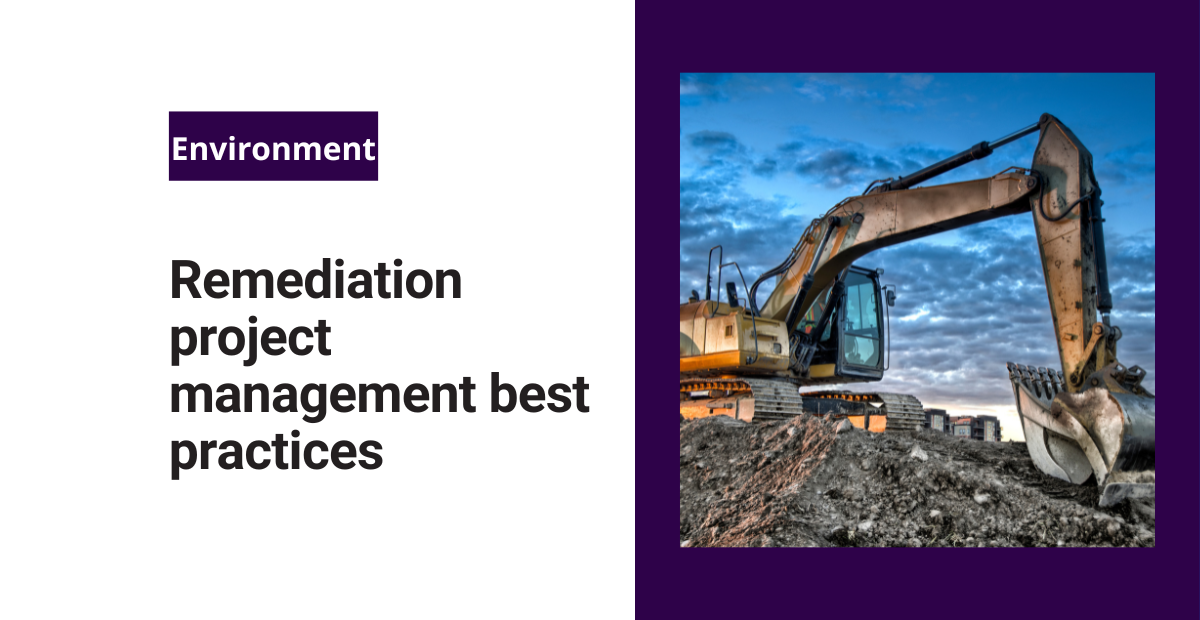As an experienced EHS professional, I’ve had the opportunity to manage a variety of remediation projects over the years. From small-scale soil cleanup to large-scale groundwater remediation, I have learned a lot about what it takes to successfully manage these types of projects.
In this post, I want to share some of my experiences and provide some best practices for managing a remediation project at your company.
My experience with remediation
In my experience, remediation project management can be a complex and challenging endeavor. It requires a combination of technical expertise, project management skills, and the ability to effectively communicate and collaborate with a wide range of stakeholders.
You can find success by:
- Understanding the scope of the project
- Defining the specific objectives you want to achieve
- Developing a detailed project plan
- Identifying and assessing the risks associated with the project
- Creating a plan to mitigate the potential risks
- Keeping the project on track to stay within your designated budget
- Communicating with regulatory agencies, community members, and the project team
Project steps to follow
Below are the key steps that you should follow when rolling out a remediation project.
Develop a detailed project plan
Your project plan should include a clear description of the scope of the project, the objectives you need to achieve, and the steps you’ll take to meet those objectives.
Identify and assess risks
This step includes identifying the potential risks associated with the project and assessing the likelihood and potential impact of those risks.
Develop a risk management plan
A risk management plan should include specific strategies for mitigating the identified risks. It may include things like implementing safety measures, conducting regular safety training, and performing regular safety audits.
Communicate often and effectively
Effective communication is critical when managing a remediation project. You want to be sure that every team and organization connected to the project has the most up-to-date information.
Effective communication involves giving regular updates and reaching out to people in a way that they’re most likely to receive the information. For example, you don’t want to send out a company-wide email if the project only applies to a select few departments.
Instead, create a separate email group that stakeholders can subscribe to or hand-pick email recipients yourself. This reduces the likelihood that your communications go unnoticed (or marked as spam).
Monitor and measure progress
Regularly monitoring and measuring progress is important to ensure that the project is on track and that you identify any issues in a timely manner.
Mistakes to avoid
In my experience, some common mistakes that can occur when managing a remediation project include:
Lacking a detailed project plan: Without a detailed project plan, it’s difficult to stay on track and ensure that the project stays within budget.
Failing to manage risks: This can lead to unexpected issues which delay progress and increase the total cost of the project.
Communicating ineffectively: Poor communication can lead to misunderstandings, delays, and increased costs.
Not monitoring and measuring progress: If you don’t track your progress, it can be difficult to recognize if you’re spending unnecessary resources on a portion of the project. Managing your progress not only helps the project stay on track, but it’s essential for recording costs and reporting developments to key stakeholders.
Measuring success in a remediation project
One thing I want you to be aware of is that measuring success in a remediation project can be challenging. However, I want to offer some of the key metrics that I think are the most effective for evaluating success. They include:
Compliance with regulatory requirements: This includes ensuring that the project follows all relevant regulations and that you’ve obtained all the necessary permits and approvals.
Completion within budget: It’s important to establish a realistic budget and to hold yourself accountable to it.
Meeting project objectives: Using this as a success metric means that you’re going to need specific goals. Don’t skip the objective-setting step at the beginning of your project, you’ll regret it when it comes time to report on how you did.
Overall, remediation project management boils down to careful planning and consistent assessment of your progress. Take the time to clearly define your objectives before you start and know what steps you’re going to follow.
That way, even if issues arise, you can fall back onto your plan and avoid the overwhelm that comes with troubleshooting.
Other posts you might like…
No posts
